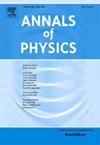利用局部量子Fisher信息量化非马尔可夫性
IF 3
3区 物理与天体物理
Q2 PHYSICS, MULTIDISCIPLINARY
引用次数: 0
摘要
开放量子系统(OQSs)中的非马尔可夫性特性由于其对量子信息处理的深远影响而越来越受到人们的关注。这种现象的产生是由于系统的进化受到其先前与环境的相互作用的影响。为了更好地理解这些复杂的动力学,人们提出了各种各样的测量方法,包括基于可分性、量子互信息和跟踪距离的测量方法。这些方法中的每一种都提供了关于OQSs行为的不同视角。在这里,我们介绍了一种新的方法来量化非马尔可夫性,重点是计量非经典相关。该方法基于多组分量子系统的量子相关性的不和谐测量,称为局部量子费雪信息(LQFI),该方法由Kim等人(2018)介绍。它被定义为量子费雪信息相对于局部观测值和测量值的最小化。因此,我们研究了一些例子,通过将我们的度量应用于三个不同的通道来澄清它的使用:相位阻尼通道,幅度阻尼通道和去极化通道。与其他方法相比,该新度量侧重于相关的二部2⊗d系统,具有清晰的物理解释,并有效地捕获了非马尔可夫性的特征。我们证明了开放相关二部系统的非马尔可夫演化或马尔可夫演化分别对应于量子态量子量的增加或减少。这个量子量是通过所有局部冯·诺伊曼测量中测量引起的费雪信息的最大值来量化的。与基于局部量子不确定性的非马尔可夫性测量相比,我们的研究结果证实,LQFI的非单调演化揭示了更高程度的量子信息回流,并且比基于量子不确定性的相应测量更具鲁棒性。本文章由计算机程序翻译,如有差异,请以英文原文为准。
Quantifying non-Markovianity via local quantum Fisher information
Characterizing non-Markovianity in open quantum systems (OQSs) is gaining increasing attention due to its profound implications for quantum information processing. This phenomenon arises from the system’s evolution being influenced by its previous interactions with the environment. To better understand these complex dynamics, various measures have been proposed, including those based on divisibility, quantum mutual information, and trace distance. Each of these measures provides a different perspective on the behavior of OQSs. Here, we introduce a novel approach to quantifying non-Markovianity by focusing on metrological non-classical correlations. This approach is based on a discord-like measure of quantum correlations for multi-component quantum systems known as local quantum Fisher information (LQFI), which was introduced in Kim et al. (2018). It is defined as the minimization of quantum Fisher information with respect to local observables and measurements. Thereby, we examine some examples to clarify the use of our metric by applying it to three different channels: the phase damping channel, the amplitude damping channel, and the depolarizing channel. In contrast to other approaches, this new metric focuses on correlated bipartite systems, has a clear physical interpretation, and effectively captures the features of non-Markovianity. We demonstrate that the non-Markovian or Markovian evolution of an open correlated bipartite system corresponds to an increase or decrease, respectively, in the quantumness of the quantum state. This quantumness is quantified by the maximum of the measurement-induced Fisher information across all local von Neumann measurements. Compared to measuring non-Markovianity based on local quantum uncertainty – a measure of non-classical correlation of the discord type based on single observables – our results confirm that the nonmonotonic evolution of the LQFI reveals a higher degree of backflow of quantum information and is more robust than the corresponding measure based on quantum uncertainty.
求助全文
通过发布文献求助,成功后即可免费获取论文全文。
去求助
来源期刊

Annals of Physics
物理-物理:综合
CiteScore
5.30
自引率
3.30%
发文量
211
审稿时长
47 days
期刊介绍:
Annals of Physics presents original work in all areas of basic theoretic physics research. Ideas are developed and fully explored, and thorough treatment is given to first principles and ultimate applications. Annals of Physics emphasizes clarity and intelligibility in the articles it publishes, thus making them as accessible as possible. Readers familiar with recent developments in the field are provided with sufficient detail and background to follow the arguments and understand their significance.
The Editors of the journal cover all fields of theoretical physics. Articles published in the journal are typically longer than 20 pages.
 求助内容:
求助内容: 应助结果提醒方式:
应助结果提醒方式:


